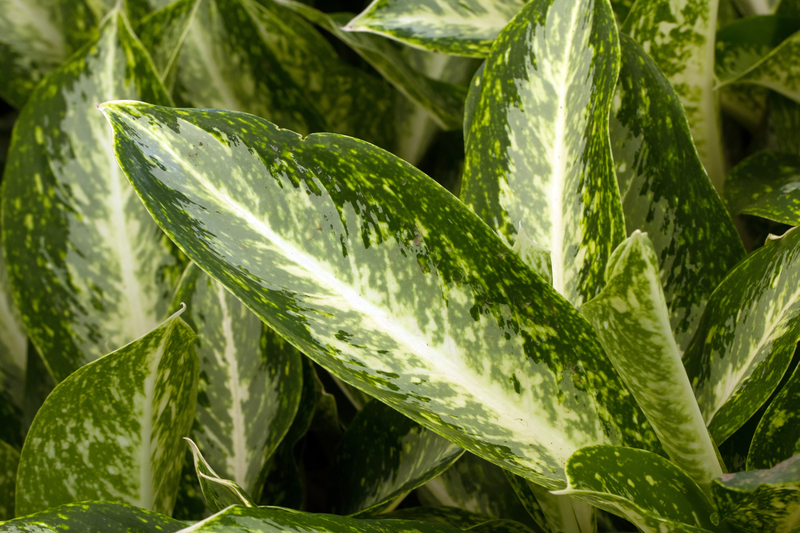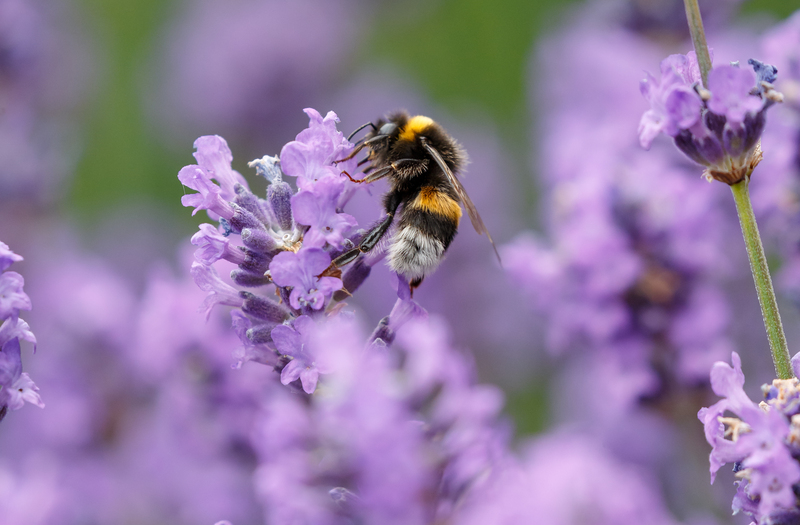Maximize Garden Efficiency with Three Weed Control Strategies
Posted on 18/06/2025
Maximize Garden Efficiency with Three Weed Control Strategies
Weeds can be a gardener's worst enemy. These unwelcome guests compete with your plants for essential nutrients, water, and sunlight. By overshadowing your crops and ornamentals, weeds can significantly reduce garden productivity. Mastering effective weed control strategies is crucial for every gardener who wants to maximize their garden's efficiency and yield.
Whether you manage a sprawling vegetable patch or nurture a compact flower bed, understanding and implementing the right weed management techniques can transform your green space. In this comprehensive guide, we'll explore three powerful weed control approaches, their pros and cons, and actionable tips to keep your garden flourishing all season long.

Why Is Weed Control Essential?
Weed control is more than a matter of aesthetics. Weeds can:
- Compete for nutrients: Weeds rob your chosen plants of essential minerals, often out-competing them for soil resources.
- Steal sunlight: Fast-growing weeds can overshadow smaller plants, inhibiting photosynthesis.
- Harbor pests and diseases: Many weeds provide a haven for garden pests and plant fungi.
- Reduce garden efficiency: By crowding out desired crops, weeds lower overall yield and vascular health.
Efficient weed management not only ensures the health of your garden but also saves time, effort, and money in the long run. Let's explore three top strategies you can use to eliminate weeds and boost your garden's performance.
The Top Three Strategies to Maximize Garden Efficiency
- Mulching: Covering soil to suppress weed growth and conserve moisture.
- Cultural and Mechanical Control: Utilizing planting practices and hand tools or equipment to disrupt weed development.
- Organic and Chemical Weed Management: Safely applying herbicides or natural alternatives for difficult infestations.
1. Mulching: Your First Line of Defense Against Weeds
Mulching is an ancient gardening technique that remains relevant today. It involves covering your soil with a protective layer to block sunlight, reduce evaporation, and suppress weed seed germination. Garden mulch can be organic or inorganic, each with its own set of features.
Types of Mulches
- Organic Mulch: This category includes straw, wood chips, shredded leaves, compost, and grass clippings. These materials not only keep weeds at bay but also enrich the soil as they decompose.
- Inorganic Mulch: Options include gravel, black plastic, and landscape fabric. These do not add to soil fertility but offer extended weed suppression and erosion control.
How Mulching Maximizes Garden Efficiency
- Suppresses Weed Growth: Blocks light, hindering germination and seedling development.
- Conserves Moisture: Reduces evaporation, so you water less and plants stay hydrated.
- Improves Soil Condition: Some mulches break down and add nutrients, boosting soil organic matter.
- Regulates Soil Temperature: Shields roots from extreme heat and cold.
Mulching Tips for Effective Weed Control:
- Apply a thick layer--typically 2 to 4 inches of organic mulch for optimum weed barrier.
- Replenish mulch as it breaks down throughout the season to maintain coverage.
- Keep mulch away from plant stems to prevent rot and discourage pests.
- Use landscape fabric under decorative mulch in particularly weedy areas for double-layered protection.
Quick Tip: Avoid using herbicide-treated grass clippings as mulch in vegetable gardens to ensure plant safety.
2. Mechanical and Cultural Weed Control: Tilling, Weeding, and Smart Planting
Mechanical and cultural control forms the backbone of traditional garden weed management. These strategies involve physical removal, soil cultivation, and planting practices designed to disrupt weed life cycles and create an environment where weeds struggle to thrive.
Mechanical Weed Management Methods
- Hand Weeding: The classic approach, ideal for raised beds and closely-planted crops. Weeding by hand ensures you selectively remove only the undesired plants.
- Hoeing: A sharp hoe can sever weeds at the soil surface. Hoeing is most effective on young weeds before they establish deep roots.
- Tilling: Turning and aerating the soil uproots weed seedlings and buries weed seeds deeper into the subsoil where they are less likely to germinate.
Cultural Weed Control Practices
- Crop Rotation: Changing plant families annually prevents specialized weeds from adapting and thriving.
- Dense Plant Spacing: Planting crops closer together shades the soil surface, making it hard for sunlight-dependent weed seeds to sprout.
- Cover Crops: Green manures like clover or rye cover bare soil, out-compete weeds, and improve soil health when turned under.
- Timing Irrigation: Water only around your desired plants to discourage weed seed germination in open spaces.
Best Practices for Maximum Mechanical and Cultural Weed Control:
- Weed early and often--young weeds are easier to remove and less likely to reseed.
- Remove entire root systems when hand-pulling sturdy perennial weeds like bindweed or dandelions.
- Till only when necessary as excessive tilling can bring buried weed seeds to the surface and stimulate a new flush of germination.
- Clean tools between beds to avoid moving weed roots and seeds to new plots.
Did You Know? Some weeds, like purslane and chickweed, can re-root and grow if tossed on moist soil. Always compost or discard pulled weeds properly to prevent re-infestation.
3. Organic and Chemical Weed Management
For stubborn weeds and large areas, organic and chemical controls may be necessary. However, these should be a last resort after cultural and mechanical strategies. Used responsibly, they can help maximize your garden's efficiency while minimizing environmental impact.
Organic Weed Control Solutions
- Natural Herbicides: Vinegar, hot water, and salt solutions can be applied directly to the foliage of small, annual weeds. Note: These are non-selective and may harm desired plants if not used carefully.
- Flame Weeding: Directing a controlled flame over weeds, particularly between rows in vegetable gardens. The brief, intense heat kills the top growth of seedlings.
- Corn Gluten Meal: This natural byproduct can be spread as a pre-emergent, preventing certain weed seeds from sprouting.
Chemical Weed Control: Best Practices
- Selective vs. Non-Selective Herbicides: Use only targeted herbicides for your specific weed problem. Read labels carefully to protect nearby crops and pollinator habitats.
- Spot Application: Apply chemicals only to affected areas, avoiding blanket spraying, to reduce environmental impact.
- Follow timing recommendations: Apply pre-emergent herbicides before seeds germinate and post-emergent after weeds emerge.
- Observe weather forecasts: Avoid spraying before rain, which can cause runoff into waterways or neighboring beds.
Important Safety Note: Always wear protective gloves and masks when handling herbicides. Store products out of reach of children and pets.
Integrating Weed Control Strategies for Ultimate Efficiency
The most efficient gardens rarely rely on a single weed management method. By combining mulching, mechanical removal, and judicious use of organic or chemical products, you can create a resilient, low-maintenance garden that stays productive year-round.
- Start with prevention: Mulch and dense planting from the outset to deter weeds before they emerge.
- Scouting and Intervention: Walk your garden regularly, removing new weeds before they produce seeds.
- Use organic/chemical options selectively: Reserve these for infestations that can't be managed by other means, and always follow eco-friendly practices.

Frequently Asked Questions about Weed Control and Garden Efficiency
Is manual weeding effective for large gardens?
Manual or hand weeding is highly effective for small beds and specific trouble spots. For larger areas, combine hand weeding in key zones with mulching and mechanical tools for manageable weed control.
Should I use black plastic or landscape fabric for weed control?
Landscape fabric is ideal for perennial flower and shrub beds where you don't disturb the soil often. Black plastic is better suited for annual vegetable rows but may cause soil overheating and reduce water/air exchange. Consider the needs of your plants before choosing.
How often should I mulch my garden?
Reapply organic mulch each season or as needed--typically every 6 to 12 months. Inorganic mulches last longer but should be checked for shifts or thinning after storms and heavy use.
Are natural weed killers safe for edible gardens?
Most natural weed killers like vinegar and boiling water are non-toxic but non-selective. Apply directly to the weeds only, avoiding overspray on vegetables and herbs. Organic solutions are generally safer, but always test on a small area first.
Conclusion: Take Control and Transform Your Garden
Maximizing garden efficiency depends on proactive, well-rounded weed control strategies. By integrating mulching, mechanical and cultural practices, and targeted applications of organic or chemical controls, you can enjoy a healthier, more productive, and beautiful garden. Each method complements the others, forming a robust defense system that tackles weeds before they become a serious problem. Remember, consistent effort pays off--nurture your soil, monitor your plants, and stay ahead with proactive weed management!
Ready to reclaim your garden from weeds? Start today by assessing your current weed challenges and implementing these three professional strategies. Your plants--and your harvest--will thank you!
Latest Posts
Garden Transformations on a Budget for the Time-Strapped
Steps to a Playful and Secure Garden for Children
Unlock the Secrets to Designing Breath-Taking Garden Seating

